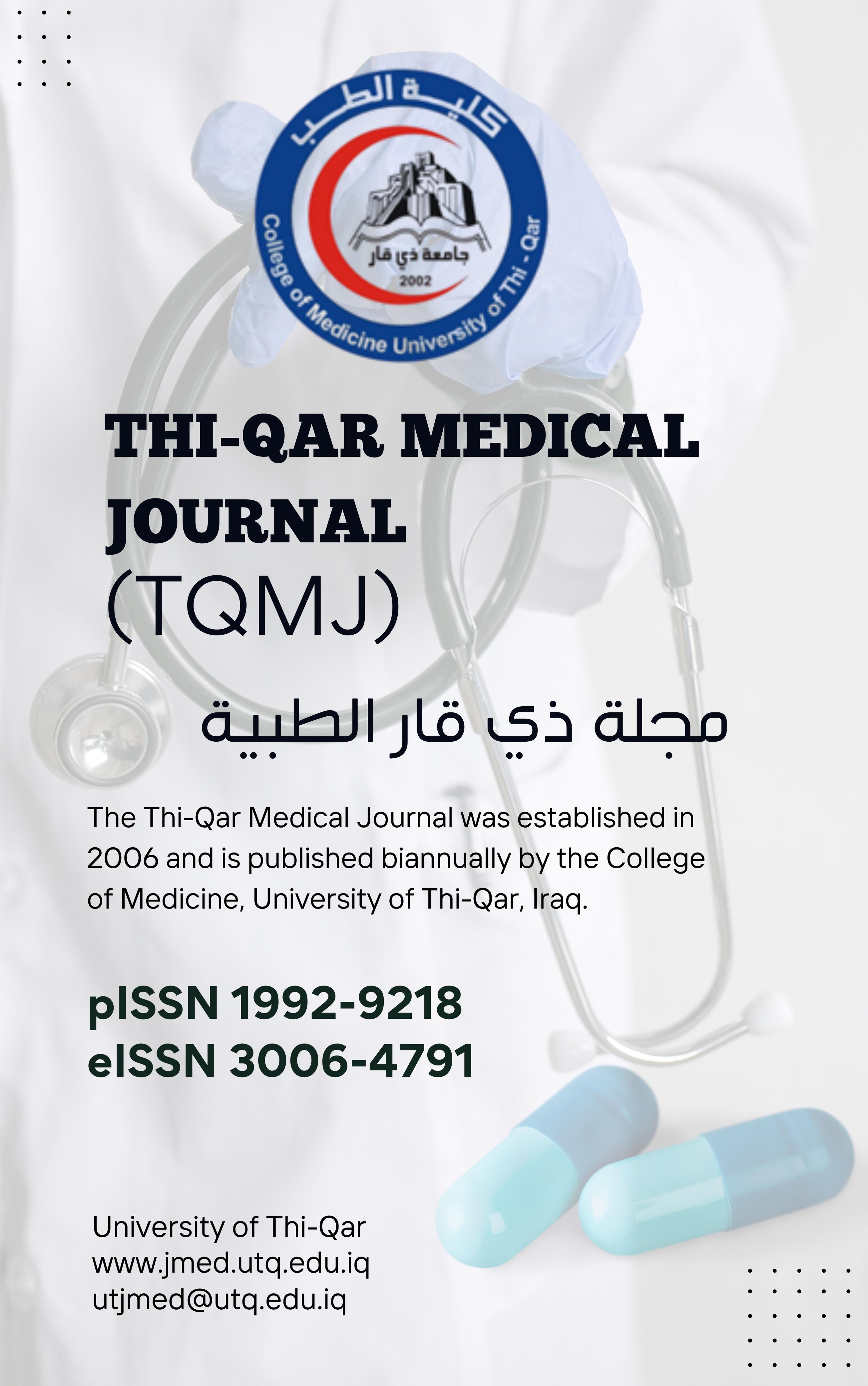Assessment of Implementation of Integrated Management of Childhood Illnesses in Primary Health Care Centers/ Baghdad 2021
DOI:
https://doi.org/10.32792/jmed.v27i1.536Keywords:
IMCI, Baghdad, PHCCs, Under-five deathsAbstract
Background: Every year some 12 million children in developing countries die before they reachtheir fifth birthday. Seven in ten of these deaths are due to acute respiratory infections (mostly
pneumonia), diarrhea, measles, malaria, or malnutrition. The IMCI was developed in response to
many global under-five deaths in low- and middle-income countries in the 1990s. This study aimed
to assess the compliance of health workers to the guiding booklet of IMCI in the management of
cases.
Methods: A cross-sectional study was conducted in the four primary healthcare centers (PHCCs)
in Baghdad for 5 months. A total of 223 children aged between 2 months to 5 years who attended
the selected four PHCCs in their initial visit were recruited. A structured questionnaire was
designed for this study, including information about the recruited children and assessment criteria
of the IMCI guiding booklet for case management.
Results: The assessment of the 6 domains of IMCI guidelines were as follows: high/perfect scores
were detected in 86.6% for cough/difficulty breathing, 100% for diarrhea, 37.6% for fever, 100%
for ear problems, 78.5% for throat problems, while weak score was detected in 71.8% for anemia
and malnutrition. Out of the 223 children, 182 (81.6%) received treatment, antibiotics were
prescribed for 99 (44.4%) of them, and (88.9%) of these cases received antibiotics according to the
IMCI guidelines. In most of the cases (94.5%) treatment administration was explained to the
patient's relative and 59.9% were asked if they understood how to administer it.
Conclusions: Adherence of physicians to IMCI guidelines regarding cough/difficulty breathing,
diarrhea, ear problems, and throat problems was high, while it was low in terms of fever and
anemia/malnutrition. We recommend the installation of an internal audit system with clear criteria
to allow evaluation of PHCCs and their employees' performance at regular intervals.
References
Abebe AM, Kassaw MW, Mengistu FA. Assessment of factors affecting the
implementation of integrated management of neonatal and childhood illness for treatment of underfive children by health professionals in health care facilities in Yifat Cluster in North Shewa Zone,
Amhara Region, Ethiopia. International Journal of Pediatrics. 2019;2019.
https://www.ncbi.nlm.nih.gov/pmc/articles/PMC6948312/
Unit. WHO Chad. Integrated Management of Childhood Illness. [28 May, 2020].
Tulloch J. Integrated approach to child health in developing countries. The Lancet. 1999;354:
SII16-SII20.
https://www.thelancet.com/journals/lancet/article/PIIS0140-6736(99)90252-0/fulltext
Gera T, Shah D, Garner P, Richardson M, Sachdev HS. Integrated management of childhood
illness (IMCI) strategy for children under five. Cochrane Database of Systematic Reviews.
(6).
https://www.ncbi.nlm.nih.gov/pmc/articles/PMC4943011/
Nguyen DTK, Leung KK, McIntyre L, Ghali WA, Sauve R. Does integrated management of
childhood illness (IMCI) training improve the skills of health workers? A systematic review and
meta-analysis. PloS one. 2013;8(6): e66030.
https://www.ncbi.nlm.nih.gov/pmc/articles/PMC3680429/
Boschi-Pinto C, Labadie G, Dilip TR, Oliphant N, Dalglish SL, Aboubaker S, et al. Global
implementation survey of Integrated Management of Childhood Illness (IMCI): 20 years on. BMJ
open. 2018;8(7): e019079.
https://www.ncbi.nlm.nih.gov/pmc/articles/PMC6067364/
Abdulrahman A, Saleem AM. Implementation of Integrated Management of Childhood
Illness Strategies in Al Hadbaa Primary Health Care Center in Mosul City. Annals of the College
of Medicine, Mosul. 2019;41(1):75-80.
https://api.semanticscholar.org/CorpusID:201959207
Masadeh MM, Alzoubi KH, Al-Azzam SI, Al-Agedi HS, Abu Rashid BE, Mukattash TL.
Public awareness regarding children's vaccination in Jordan. Human vaccines &
immunotherapeutics. 2014;10(6):1762-6.
https://www.ncbi.nlm.nih.gov/pmc/articles/PMC5396239/
Legesse E, Dechasa W. An assessment of child immunization coverage and its determinants
in Sinana District, Southeast Ethiopia. BMC Pediatrics. 2015; 15:1-14.
https://www.ncbi.nlm.nih.gov/pmc/articles/PMC4438454/
Centre WHOM. Iraq scales up efforts to improve maternal and child health in line with
Dubai Declaration commitments. [29 May 2020.].
https://www.emro.who.int/media/news/maternal-child-health-iraq.html.
Organization WH. Child and adolescent health and development: progress report 2006-
: highlights. 2008.
https://www.who.int/publications/i/item/9789241595384
Nicholas D, Thomas L, Jacek S, Emmy M, Elizeus K, Brendan F, et al. Why first-level
health care workers fail to follow guidelines for managing severe disease in children in the Coast
Region, the United Republic of Tanzania. Bull World Health Organ. 2009;87(99):107.
https://www.ncbi.nlm.nih.gov/pmc/articles/PMC2636200/
Drobac PC, Basinga P, Condo J, Farmer PE, Finnegan KE, Hamon JK, et al.
Comprehensive and integrated district health systems strengthening: the Rwanda Population
Health Implementation and Training (PHIT) Partnership. BMC Health Services Research. 2013;
:1-13.
https://www.ncbi.nlm.nih.gov/pmc/articles/PMC3668243/
Tawfiq W A AHA-HETAK. Integrated management of childhood illnesses: the situation in
Iraq. Al-Nahrain University College of Medicine. 2009.
https://www.nahrainuniv.edu.iq/en/node/1759
Leung A, Prince T, Society CP, Nutrition, Committee G. Oral rehydration therapy and early
refeeding in the management of childhood gastroenteritis. Pediatrics & Child Health.
;11(8):527-31.
Downloads
Published
Issue
Section
License
Copyright (c) 2024 University of Thi-Qar Journal Of Medicine

This work is licensed under a Creative Commons Attribution-NonCommercial-NoDerivatives 4.0 International License.




